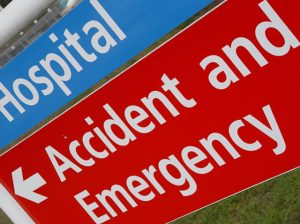It happens to the all of us. We go from month to month diligently planning our spending, category by category, tracking where the money goes, not over doing it, debt is being paid off, savings are on target and then… WHAM!! Out of left field we get hit by an expense that we never saw coming. If you’re not prepared it can set you back in you savings or worse it can drag you down into debt. Ouch! So what’s a conscientious budgeter to do?
 Emergencies aren’t all serious, it might be a cavity that blows out the dentist’s bill. Or maybe a pet gets the flu and visit to the vet turns out to be more expensive that you thought. Sometimes they are serious though, the loss of a job, a serious illness for example. The unexpected happens, and there’s nothing we can do about it. But if you don’t know what will happen or when, how can you hope to budget for it?
Emergencies aren’t all serious, it might be a cavity that blows out the dentist’s bill. Or maybe a pet gets the flu and visit to the vet turns out to be more expensive that you thought. Sometimes they are serious though, the loss of a job, a serious illness for example. The unexpected happens, and there’s nothing we can do about it. But if you don’t know what will happen or when, how can you hope to budget for it?
Actually it’s not difficult. All you need to do is set aside a savings fund specifically for emergencies. Its a buffer and having a savings buffer means you won’t need to borrow money if a crisis happens and you need money in a hurry. It will give you peace of mind that you can face a few bumps in the road.
How much should my emergency fund be? Generally you should be aiming for somewhere between 1-3 months of living expenses, if that sounds like a stretch don’t worry. Like any savings target, just start small, save consistently and your emergency fund will build up over time. Just $10 a week will get you to $500 by the end of the 1st year. In fact, if you really want to be diligent you’ll allocate your savings first and only spend what is left.
Happy Budgeting!

